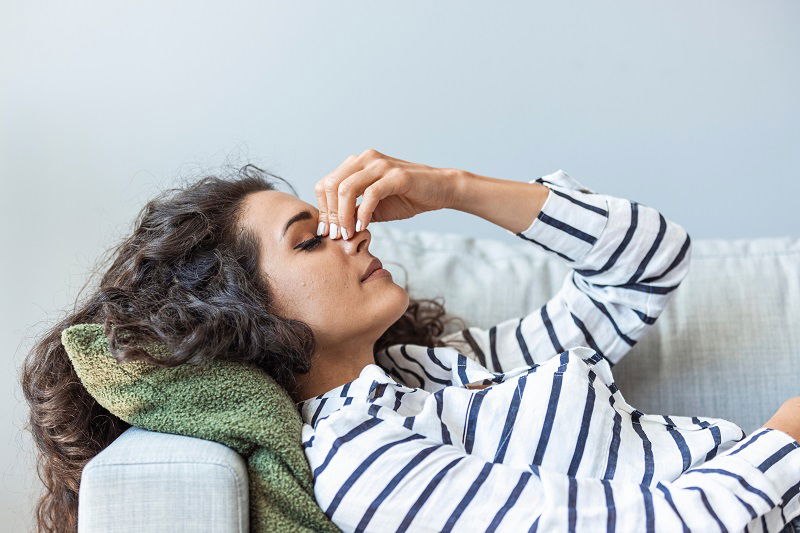When you think of allergy symptoms, you may think of sneezing, watery eyes, or a runny nose. However, many people suffer from headaches caused by allergies. Here is why allergies can cause headaches and how to treat them.
Can allergies cause headaches?
Yes, allergies can cause headaches. Allergies can cause sinus headaches and migraine headaches.
The sinuses are a series of connected, hollow spaces in the skull that are lined with soft tissue and a layer of mucus. The role of the sinuses is to help humidify and filter the air you breathe, as well as help drain the nose. Allergy symptoms often appear in the sinuses. Some of the spaces that make up the sinuses are found in:
- Forehead
- Between or behind the eyes
- Cheekbones
- Behind the nose
This is why allergy symptoms can cause pain in the head or face. If your sinuses are swollen or their openings are obstructed, you may experience sinus pain or a sinus headache. This is because swelling and blockage in the sinuses can prevent normal drainage and airflow, leading to a buildup of pressure.
Other allergy triggers, such as smoke or certain foods, can also trigger allergy headaches. In addition, allergies can cause migraine headaches. Migraines often include throbbing, may be felt in one side of the head, and may be accompanied by nausea.
How can you treat headaches caused by allergies?
If your allergy headache is caused by congestion, over-the-counter allergy medications can help to reduce your allergy symptoms, which can then relieve your headache. Over-the-counter medications for allergies and allergy headaches include antihistamines, decongestants, and intranasal corticosteroids. These medications can help to relieve congestion and ease your headache. You will typically need to take your medication every day as long as you are exposed to the allergen.
How can you prevent allergy headaches?
Of course, it is best to prevent allergy headaches altogether! The best way to prevent allergy headaches is to avoid the trigger. If you are unsure what your trigger is, try keeping a journal for a few weeks where you record when you have a headache and what is going on at that time. This can help you determine what is triggering your allergy headaches. Once you have found your trigger, you can better avoid it.
Depending on the triggers, you may need to change the products you use, switch up your diet, or remove certain plants or odors that trigger your symptoms. If you notice that you are most often triggered outdoors, do your best to stay indoors when pollen or mold are at their highest, or when it is windy. If you have indoor triggers, you can try the following preventive measures:
- Change air filters regularly and make sure your furnace and air conditioning unit are properly maintained.
- Keep your home’s humidity between 30 and 50 percent to discourage mold growth.
- Use allergy-friendly covers for pillows, mattresses, comforters, and box springs.
- Avoid dry dusting or sweeping, which can stir up possible allergens. Instead, clean the floor and other surfaces with a damp rag or mop.
- Wash your hands after touching animals and wash your clothes after visiting homes with pets.
- Avoid using strongly scented products like scented candles or air fresheners.
When to seek professional help for allergy headaches
If you find that taking over-the-counter medications and making lifestyle changes do not relieve your allergy headaches, you should seek professional medical help. An allergist can help to evaluate your allergies and sinuses, prescribe medication, and recommend other treatments that may help ease your headaches.
To learn more, we invite you to contact us today at West River ENT & Allergy.




